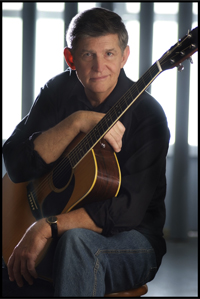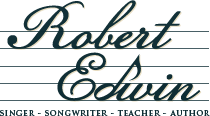Welcome to the Robert Edwin Studio!
Robert Edwin Studio est. 1975 — Robert Edwin est. 1946
Shopping for a singing teacher?

Advice from a pro
by Robert Edwin
BIOGRAPHY
How do you find a good singing teacher? How do you match your needs to the teacher's skills? What questions do you ask?
The voice is your vehicle
Teaching vs. coaching
Rock on Mozart ?
First Lesson
Talent and motivation
The voice is your vehicle
You're a singer, maybe even a professional, but someone or something is telling you that your chops need to improve. You've decided to take some singing lessons, so you ask your singer friends for some names, you check the yellow pages, you surf the web, all in search of that teacher who'll help you take your voice and your singing to a higher level.
Trying to find a good singing teacher is like trying to find a good auto mechanic: you want one you can trust, who understands your needs, and one who knows what he or she is doing. Take me and my friend Chuck, for example. As singing teacher and auto mechanic respectively, we have a lot in common. We both know our customers' "vehicles" inside and out. We know how to maintain them, and most importantly, we have good ears and eyes to diagnose and fix them when they have problems.
We also know our customers. Some come to us very informed about their vehicles, while others know little or nothing. We understand that certain customers require a lot of time and patience as we explain what's wrong, what needs to be done, approximately how long it will take, and how much it will cost, while other customers understand quickly what's going on. Whatever the case, it's our job to meet them where they are and lead them to where they need to be.
Teaching vs. coaching
If you're looking to improve your singing, help comes in two forms: a voice teacher or a voice coach. A voice teacher is someone who works primarily on technique, the "how-to-sing" part of singing. Technique has to do with training muscles to do what they're supposed to do in the act of singing. It includes the breathing muscles (respiration), the sound-producing muscles (phonation), the sound-quality muscles (resonation), and the sound-shaping muscles (articulation). Through various exercises such as scales, triads, and arpeggios, these muscles eventually gain more strength, coordination, and flexibility.
A voice coach, on the other hand, is someone who works primarily on performance and repertoire, the "what-to-sing" part of singing. That includes picking songs that suit you and your voice, putting them in keys that fit your vocal range, and helping you develop the performance skills and confidence to sing the songs well. There are teachers, including this teacher, who work on both technique and repertoire during a lesson.
If you're a beginning singer, or an advanced singer with some vocal issues to solve, the voice teacher should be your first stop. Solving technical problems will clear the way for better repertoire and performance development.
Rock on Mozart ?
Whether your search is for a voice teacher, a voice coach, or both, be aware that many teachers and coaches are specialists who only work with one style of singing. So if you're a rock 'n' roller, studying with an exclusively classical teacher may not be your best choice. You need someone who understands the technique, the style, and the repertoire of YOUR music.
Don't let anyone tell you that classical vocal technique and rock technique are the same, or that "if you learn to sing classically, you can sing anything." It's just not true, as evidenced by how badly and awkwardly many opera singers sing pop and rock material when they try it. Classical vocal technique emphasizes formal language, full and resonant vowels sounds, and a constant vibrato from the onset of the tone. Pop and rock, meanwhile, demand conversational language, narrow and sometimes even noisy vowel sounds, and little if any sustained vibrato. < br>
First Lesson
Armed with that information, let's say your search has landed you in Ms. Pedagogue's studio. What should you expect? The first lesson usually begins with you singing a song of your choosing so the teacher can see and hear what you can do as a performer. What follows next may be some vocal exercises to determine such things as your vocal range, pitch accuracy, breathing habits, register coordination, dynamic levels, rhythmic skill, agility, and tonal memory.
Near the end of the lesson, the teacher should give you some idea of what she perceives as your strengths and weaknesses. These need to be measured against your own list of perceived strengths and weaknesses. This is a critical comparative evaluation because if you think you sound like Britney Spears and the teacher thinks you sound like Britney with a spear in her throat, you're obviously not on the same page. Unrealistic expectations and inaccurate or uncritical estimates of talent and ability can doom a student/teacher relationship from the start. A teacher who fawns over you and tells you you're the most wonderful singer she's ever heard may make your ego feel good but may not help you to get better as a singer. Conversely, a teacher who is critical to a fault and very stingy with praise may squash your confidence and stifle your growth.
Talent and motivation
Simply put, the teaching-learning process gets down to two things: the talent and motivation of both teacher and student. Singers are not created equal. Some of us have been given a large amount of that genetically-imparted ingredient called talent, while others have been given very little. Without it, aspirations beyond singing in the shower are unrealistic. No amount of motivation or hard work will overcome a lack of talent. A talented person who is highly motivated, however, is much more likely to succeed than a person who is talented but lacking motivation.
Teachers, too, must be talented and motivated. They must have the talent to hear and see good and bad technique, and the skill to reinforce the good and eliminate the bad. They must be motivated to develop to the fullest potential each singer whom they accept in their studios. They must also respect the individuality of their students and resist the urge to "clone" singers in their own image. And finally, they must be gently and affectionately honest with their students so that realistic expectations and goals can be set and achieved, even if it's to be a better shower singer!
Now, call those singer friends of yours,
check the yellow pages, surf the web. Hopefully this article
will help you find that singing teacher whom you can trust,
who knows what to do with your voice and your singing style,
and who can help you achieve your vocal and artistic goals.

Robert Edwin Studio, LLC
1509 Glenview Drive
Cinnaminson, NJ 08077-2156





